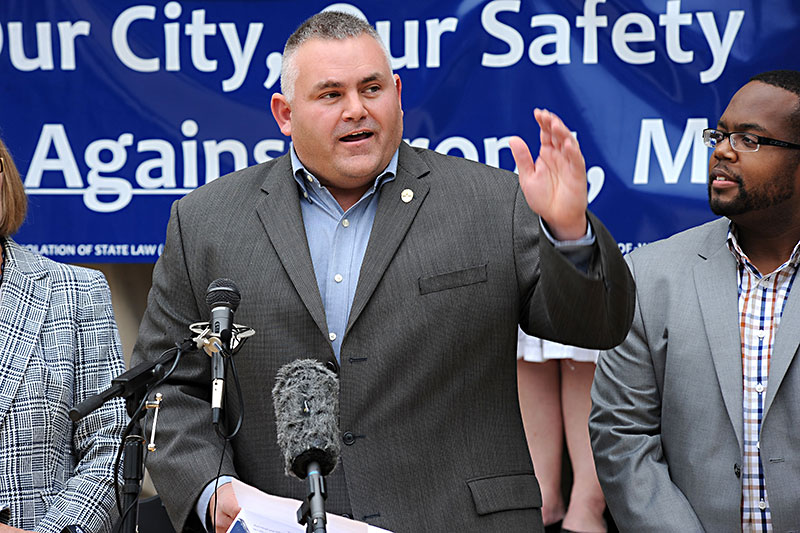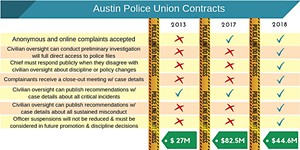Labor Negotiations: A Matter of Police Oversight
Police Monitor Deven Desai brings his agenda to bargaining sessions
By Nina Hernandez, Fri., June 16, 2017
The city and its police union resumed contract negotiations on June 8, 10 days after Labor Relations Officer Tom Stribling's untimely death and just two days after interim City Manager Elaine Hart named Larry Watts, that office's original manager, his replacement for the current round of collective bargaining with the city's three public safety labor groups. At issue were three matters relevant to oversight – as such, the dominant figure on the city's end was Deven Desai, Stribling's predecessor at the LRO and the current police monitor, holding office there on an interim basis as the city searches for a permanent replacement for Margo Frasier. Both sides recognize that any reforms on oversight specifically will make for a long, drawn-out discussion that could last through the summer, but both appear to be willing to work together on the issue.
Desai's requests appear in line with the issues raised by residents during an April 20 hearing at City Council ("Double or Nothing," May 26). He'd like to see civilians be able to file complaints against officers without issuing a sworn affidavit, citing citizens' fears of retribution and of contact with immigration officials (a fear that thus far is unfounded with respect to Austin police officers). "Just because they don't file an affidavit, why shouldn't we at least look into it?" he asked the Chronicle after last Thursday's meeting. "If it happened, it happened. We'll find out."
Desai said he also wants the Office of the Police Monitor to be able to ask questions of officers during Internal Affairs interviews, and seeks subpoena power to force officers to answer questions. He's mounting an effort to broaden the types of cases for which the Citizen Review Panel can issue disciplinary recommendations. Currently, the CRP can only recommend discipline in critical incidents (in-custody deaths, discharge of a firearm, or any other serious bodily injury as a result of an officer's use of force).
An item that could play out particularly slowly over the summer is the concept of closeout meetings, wherein the police monitor would tell a complainant if APD issued any discipline on an officer in question. Currently, citizens who file complaints are only allowed to know about an administrative discipline if the officer was suspended for one day or longer, but there are a number of other types of discipline that don't rise to that level, including oral and written reprimands, desk duty, and various types of counseling. "If you do all of those things, it's a much different story than me just telling the complainant, 'I'm sorry, the chief did not find if there was a policy violation that amounted to a suspension, so I can't tell you what happened,'" he said. "Because if I tell you that, you walk away thinking APD condoned the behavior – that the city … condones this behavior – when in fact that's not the case."
Representatives from the Austin Police Association expressed initial skepticism at the proposal, questioning why the city would give privileged information to a citizen who isn't legally bound to keep that information private. The group has a recent history with the city on this subject: Executive members were "shocked," said APA President Ken Casaday, to learn that Frasier had held informal closeout meetings during her tenure. Casaday, however, told the Chronicle that the group isn't ruling out any requested terms, and that past experience wouldn't preclude them from negotiating with the city on the subject in the future. He noted that while the contract expires at the end of September, the negotiation process could potentially continue through next April, giving both sides plenty of time to smooth out lingering details.
"We want to try to work through issues," he said. "We're going to try to work with the city on their requests, but I can guarantee you that there will probably be some requests that we agree to, and a few of them in there we don't." Casaday also cautioned: "We're not going to agree to any major changes until we get an idea of what we're going to get in return." He noted how the items the city is requesting "are rights that officers have" protected as part of the state's civil service law. "They're asking us to give those rights up."
One condition that both sides appear to agree on pertains to the amount of time cops spend waiting on third-party arbitrators to hear appeals to disciplinary cases. A current shortage of arbitrators in the area has increased the length of the appeals process to close to eight months – not counting the actual arbitration, which can take another few months. The cops suffer in limbo not knowing whether they'll be able to continue with their careers. And if an officer is found to have been wrongly suspended, for example, the city would be on the hook for back pay – not to mention that the officer's operations unit would have been short-staffed for that duration.
"What we're trying to do is come to an agreement with the city much like they do in Fort Worth and other places," said Casaday, "which is, both sides will agree that the arbitrations need to be done much faster. We're talking about [shortening the wait period to] about 90 to 120 days."
Negotiations are expected to continue through the summer. The next meeting is currently scheduled for June 22, though it's unclear when the APA will have worked through the oversight components in enough detail to discuss them again in open forum. Even Desai acknowledged that he supplied a hefty list, and the crew of APA negotiators have a lot to consider. "If you really want a good product, and you want something that makes both sides happy, it's something you don't want to rush," said Casaday. "It's something that you need to take your time doing, and make sure all your Ts are crossed and your Is are dotted. Because it leads to nothing but problems down the road when you rush things."
Got something to say on the subject? Send a letter to the editor.











